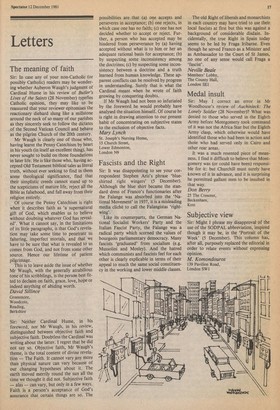The meaning of faith
Sir: In case any of your non-Catholic (or possibly Catholic) readers may be wondering whether Auberon Waugh's judgment of Cardinal Hume in his review of Butler's Lives of the Saints (28 November) typefies Catholic opinion, they may like to be reassured that your reviewer epitomises the reactionary diehard slung like a millstone around the neck of so many of our parishes as they sincerely seek to follow the dictates of the Second Vatican Council and behave as the pilgrim Church of the 20th century.
Mr Waugh is clearly one of those who, having learnt the Penny Catechism by heart in his youth (in itself an excellent thing), has never sought to build on those foundations in later life. He is like those who, having accepted Old Testament biblical tales as literal truth, without ever seeking to find in them some theological significance, find that their simplistic creeds cannot stand up to the scepticisms of mature life, reject all the Bible as falsehood, and fall away from their religion entirely.
Of course the Penny Catechism is right when it describes faith as 'a supernatural gift of God, which enables us to believe without doubting whatever God has revealed'. What it cannot say, in the limitations of its little paragraphs, is that God's revelation may take some time to penetrate us faltering, imperfect mortals, and that we have to be sure that what is revealed to us comes from God, and not from some other source. Hence our lifetime of patient pilgrimage.
This is to leave aside the issue of whether Mr Waugh, with the generally atrabilious tone of his scribblings, is the person best fitted to declaim on faith, grace, love, hope or indeed anything of abiding worth.
David Sillince
Greenmore, Woodcote, Reading, Berkshire






































 Previous page
Previous page